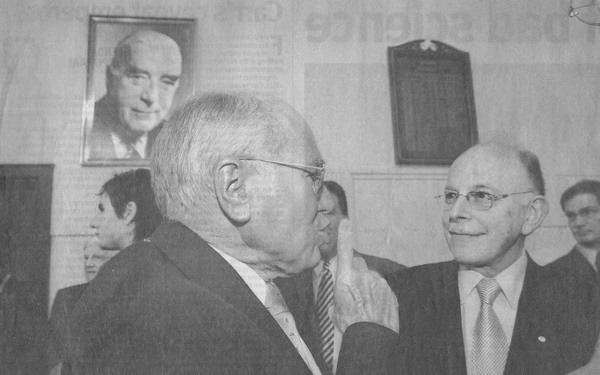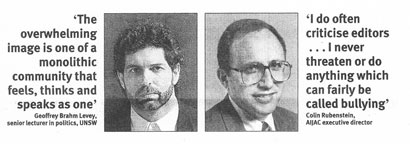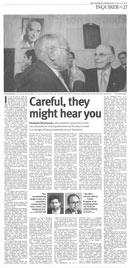This article appeared in the Weekend Australian 10-11 June 2006 p6

after the latter gave a speech at the Victorian Liberal Party headquarters
Picture: David Geraghty
Careful, they
might hear you
It can be hard to track the origins of information posted on the Internet, but for those with the patience to follow the ebb and flow, the series of entries about the Australian/Israeli & Jewish Affairs Council of the Source Watch website made fascinating regions. The original Source Watch entry said AIJAC is "a right wing think tank based in Melbourne and Sydney...which represents no one but its own small (right-wing) membership". Confronted with this blunt description, AIJAC policy analyst Jamie Hyams decided to edit it online. "The entry didn't accurately reflect what AIJAC is, Hyams tells Inquirer. What he wrote instead was: "AIJAC Does represent the views and interests of the mainstream Jewish community. AIJAC's pro-Israel stance reflects the views of the vast majority of Australia's Jewish community... Those who regard AIJAC as right-wing and only representing itself are from the Left fringe of the Australian Jewish community." This version lasted only about a day, says Hyams. SourceWatch Is funded by the Centre for Media and Democracy, and American organisation bent on exposing what it regards as spin and propaganda. The SourceWatch editor had done some editing of his own, making it clear he believed AIJAC was a small, privately funded neo-conservative think-tank. Since late March the Australian Jewish community---like Jewish communities across the world---has been caught up in the controversy over a paper titled The Israeli Lobby and US Foreign Policy by John Mearsheimer of the University of Chicago and Stephen Walt of Harvard University. Published in the London Review of Books after being accepted for publication, then rejected, by the Atlantic Monthly in the US, the paper argues that the Israeli lobby has dominated US foreign policy in the Middle East, sometimes to the exclusion of US interests (even Israel's interests in the longer term). Critics of the paper insist this is tantamount to saying a Jewish cabal is exerting the sinister influence on US foreign policy. And extract from the paper was published in Inquirer on April 22. In an opinion piece published in The Australian that month, AIJAC executive director Colin Rubenstein wrote that Mearsheimer and Walt "concoct a conspiracy theory about the vast supposed power of [the] Israeli lobby". Rubinstein said the academics had ignored "the obvious explanation" for Israel's influence: consistent public support for Israel. Even allowing for the possibility that Mearsheimer and Walt overstate their case, Rubenstein could have mentioned the effectiveness of the outfit that lobbies US senators, congressmen and other opinion-makers about Israel: the American Israel Public Affairs Committee, a body from which AIJAC takes some of its cues. Both organisations have greatly intensified activities since 9/11. Rubenstein is right on one count, however. Polls suggest that more than three-quarters of Australians support Israel's right to exist. Most will be aware there is bristling antagonism between Israel and some of its neighbours – Some of whom, notably Iran, want to bring down the Israeli state-- leaving Israelis feeling vulnerable even today. If it comes to that, Prime Minister John Howard could hardly be more supportive of Israel. But just to be on the safe side, Jewish organisations inside and outside this country have heaped him with honours, from the "award for distinguished public service" presented by the American Jewish Committee and AIJAC, it's Australian partner, to the "inaugural award for friendship and commitment" presented to Howard by the Jewish Communal Appeal. You are between 100,000 and 120,000 Jews in Australia. They represent only a bout 0 .5% of the population but are themselves represented by a legion of community organisations. Peak bodies in each state send delegates to to federal bodies, the Executive Council of Australian Jewry and the Zionist Federation of Australia. ECAJ officially speaks on behalf of all Australian Jewry. But a member of the Zionist Federation is present any time ECAJ or its constituent organisations make formal representations to the Australian government: one sign of the communities urgent and abiding preoccupation with Israel. At the Israeli Independence Day celebration at the Shangri-La Hotel in Sydney last month, NSW Premier Morris Iemma, the guest speaker, stayed on message, no sooner acknowledging the traditional owners of the land than he asserted that Aborigines and Jews had much in common. "At the heart of their common struggle is land," said Iemma, pointing to "the shared experience of suffering and oppression". As the function was held on the same day as the Israeli newspaper Haaretz reported that the hospital in the Gaza Strip had only two weeks of medicine left (because the Palestinian authorities health ministry had cut the hospital budget after suspension of international aid to Hamas), it is tempting to wonder if Aborigines confronted with the comparison would conclude they have more in common with Palestinians. |
 | |
But in the Shangri-La Hotel, the Premier had handed the microphone to the Israeli ambassador, Naftali Tamir, who was also intent on emphasising Israelis vulnerability rather than its strength, making more than one reference to those of Israelis neighbours who wish "to strike us off the map". This is the view held by most members of the Jewish community. In fact, community leaders regularly seem to suggest that those who diverge from it are ratbags and racists. NSW Green MP Ian Cohen says: "Any criticism of the strongly pro-Zionist establishment view makes people label you anti-Semitic, which is pretty offensive. There's a lot of antagonism, a paranoia that shows itself if you don't toe the party line." Even asking if some Jewish leaders are trying to stifle debate can get you rapped on the knuckles. Rug manufacturer Yosi Tal, a member of the executive of the NSW Jewish Board of Deputies, the peak body NSW, says: "Saying the Jewish lobby is trying to shut down debate is anti-Semitic." Of course, there are profound historic reasons for the reflexive accusations of anti-Semitism: as journalist Richard Cohen noted in the Washington Post in April (in response to those levelling accusations of anti-Semitism at Mearsheimer and Walt): "It comes freighted with more than 1000 years of tragic history, culminating in the Holocaust." But in modern Australia, where Jews are not only free to do as they choose but have become prominent as lawyers, doctors, businessmen and scientists out of all proportion to the numbers, there is potential manipulation in invoking the spectre of anti-Semitism to combat opposition. Critics who were Jews find themselves sidelined or bullied. "One person who'd been identified in the media as a member of [Jewish] peace group made some comment and was telephoned and abused," says Margot Salom, who is writing a university thesis about the silencing of dissent within the Jewish community. Confronted with some Israeli acts, such as the incident earlier this year when an Australian filming a protest on the West Bank was shot in the head with a rubber bullet by an Israeli soldier, mainstream community members say almost nothing in public. "The overwhelming image is one of a monolithic community that feels, thinks and speaks as one," says Geoffrey Brahm Levey, co-editor with Philip Mendes of Jews and Australian politics. Launching that book in Sydney last year, Levey said: "Such an image, I dare say, has been encouraged by some Jewish organisations themselves, for whom the appearance of unity is considered essential to securing their political objectives." The effect has been to mute all but the most tepid criticism of Israel. "I think many people are cautious about saying anything critical of Israel," says a federal Labor MP who declined to be named. "When people do say things, they've got to be careful what they say. On one level there's the hardline AIJAC element. If you say anything critical of Israel they'll use the anti-Semitism tag. There's also a much more sophisticated element...prepared to engage in a more serious way. " The sophistication was not in evidence when his Parliamentary colleague Michael Danby, the Labor member for Melbourne Ports, learned that Sydney left-wing journalist and author Antony Loewenstein was writing a book about Israel and the Australian Jewish community for Melbourne University Publishing. Last September, 11 months before the scheduled publication of Loewenstein's book, My Israel Question, Danby wrote an outraged letter about it to the Australian Jewish News, saying: "MUP should drop this whole disgusting project. If they proceed, I urge the Australian Jewish community, and particularly the Australian Jewish News, to treat it with dignified silence. That is our best response. If, God forbid, it is published, don't give them a dollar. Don't buy the book." More often it is AIJAC's Rubenstein who acts as the enforcer of acceptable opinions about Israel, picking up the phone to convey his views if a politician or media person criticises Israel without neutralising comments by savaging its enemies. Rubenstein, who has an intensely combative streak, strongly denies his tactics could be construed as bullying. "I do often criticise editors for decisions with which I disagree and urge them to make different decisions that I deem more appropriate. Surely that is a fundamental right of any Australian citizen or community group, including myself and AIJAC?" He tells Inquirer. "I never threaten or do anything else which can fairly be called 'bullying', so anyone who made such a claim is being either thin-skinned or deceptive." |
Though it is a privately run organisation, AIJAC has been remarkably successful in suggesting that its views and its voice are the legitimate views and voice of the Australian Jewish community. It is usually AIJAC that responds most rapidly to issues relating to Israel or the security of Australian Jews. From time to time this has been counter productive. In 2003, Rubenstein ran so strenuous a campaign against the then NSW premier, Bob Carr-- after Carr agreed to present the Sydney Peace Prize to Palestinian activist Hanan Ashrawi-- That even Jewish community leaders who agreed with Rubenstein's position distanced themselves from his tactics. "We... are very careful never to claim to represent the Jewish community as a whole," Rubenstein says. Yet he sometimes seems to be speaking on behalf of Australian Jewry. When Pope John Paul 11 died last year, Rubenstein and AIJAC Chairman Mark Leibler expressed their condolences in a letter published in The Australian."We would like to express our sorrow... and convey our sincere sympathy to the Catholic world. He will be remembered for his inspiring spiritual leadership... He achieved far more in terms of transforming relations with both the Jewish people and the state of Israel than any other figure in Catholic history." Though their names were followed by the name of the council, the lofty tone could have suggested they were speaking for Jews the world over. Half the Jews in Australia are Holocaust survivors or their descendents, a statistic often related to the fact that many strongly identify with Israel. There is a tendency to marginalise those who happen to disagree. "AIJAC, for better or worse, represents the majority view," says Sam Lipski, chief executive of the Pratt Foundation, which helps bankroll AIJAC. "The Left's position on Israel wouldn't have 4.9% [support] in the Jewish community." But that doesn't give a AIJAC the right to speak on behalf of Australian Jews, says Levey, a senior lecturer in politics at the University of NSW. "AIJAC is a private think tank which is not elected by anyone," says Levey, who believes that the bodies elected to represent the community have abdicated the role. Not so, says Grahame Leonard, president of ECAJ. "I know AIJAC often does the talking, but they never claim to speak on the half of the Australian Jewish community." Why then is AIJAC doing the talking, as he puts it? "They're very well resourced, they're professional and they are accessible," Leonard says. But Rubenstein can appear to exert pressure over what he deems to be "anti-Israel bias" even as he decries the lack of free speech in other quarters. When Victoria University cancelled a lecture in 2001 by visiting Israeli academic Yossi Olmert, a former advisor to right-wing Likud governments, on the dubious grounds of pressure from the local branch of the National Tertiary Education Union because pro-Palestinian academics had been affronted by the prospect, AIJAC thundered about a "gross violation of freedom of speech and academic freedom". The press release quoted Rubinstein as saying: "Are they saying these people cannot even bear to hear an alternative point of view?" Later, after hearing that the ABC had scheduled a BBC documentary highly critical of then prime minister Ariel Sharon of Likud, Rubenstein launched a campaign to have the ABC moderate it. When he subsequently complained about what he regarded as the anti-Israel bias of certain programs on ABC television and radio, the cause was taken up by Liberal Party heavyweight Michael Kroger, then an ABC board member, who wrote to then ABC executives Jonathan Shier and Max Uechtritz: "Gentlemen, could you tell me what you're going to do about the clear anti-Israeli bias exposed in Dr Rubenstein's letter?" Media Watch, which has always been the target of Rubenstein's wrath after implying criticism of some of his tactics, reported on its website that Shier and Uechtritz reacted by ordering "an inquiry into the ABC's reporting of the Middle East on radio news, TV news, Lateline, Late Night Live, Radio National breakfast, Background Briefing, Foreign Correspondent, AM, The World Today and The Religion Report." Levey, for one, questions such tactics. "Instead of just complaining about critics being anti-Semitic or one sided, Jews should be demonstrating what reasonable criticism looks like. By holding out tongues on Israel, Australian Jews do Israel, ourselves, and public debate in Australia a great disservice," he says. |
|

